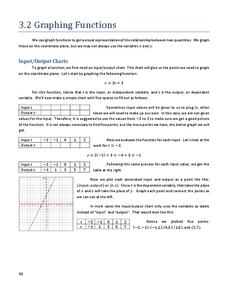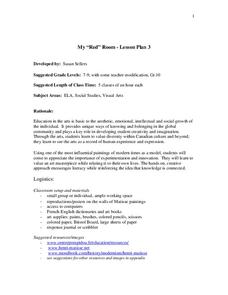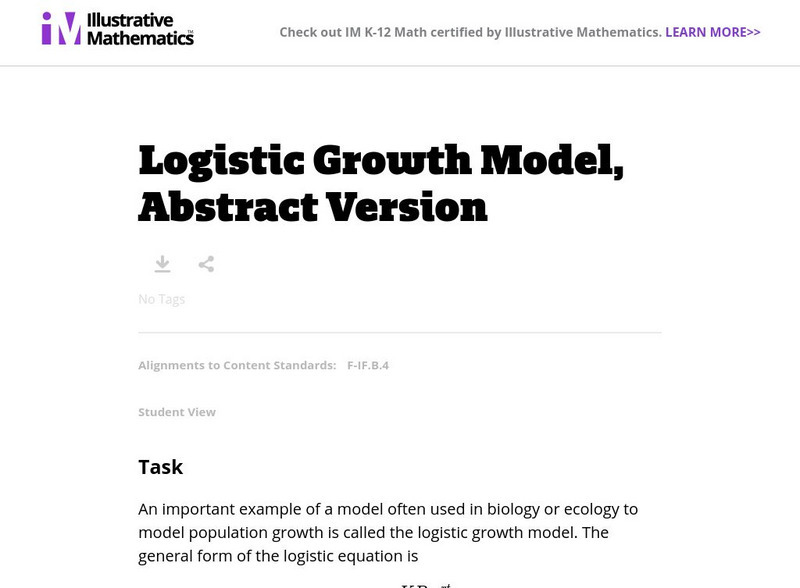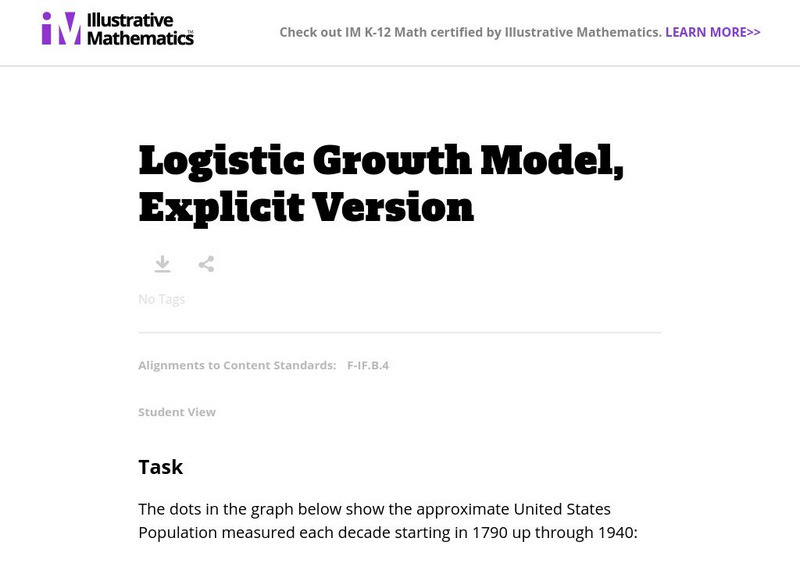Illustrative Mathematics
Logistic Growth Model, Abstract Version
Here learners get to flex some serious algebraic muscles through an investigation of logistic growth. The properties of the constant terms in the logistic growth formula are unraveled in a short but content-dense activity. Moving...
Curated OER
Logistic Growth Model, Explicit Version
Via the concrete setting of estimating the population of the US, your algebra learners are introduced to a logistic growth model. Comparing and contrasting logistic, exponential, linear and quadratic models, to see which fits the data...
Howard Hughes Medical Institute
Population Dynamics
Will human population growth always be exponential, or will we find a limiting factor we can't avoid? Young scientists learn about both exponential and logistic growth models in various animal populations. They use case studies to...
Curated OER
Logistic Growth
Through the exploration of population growth of a bacteria population, high schoolers learn about and observe bacteria population over a 20 hour period. Students graph the population growth using a scatter plot and discuss its logistic...
Serendip
Understanding and Predicting Changes in Population Size – Exponential and Logistic Population Growth Models vs. Complex Reality
Salmonella poisoning impacts over 200,000 people in the United States each year. Scholars learn about the growth of these bacteria using multiple approaches. Then they apply the same growth calculations to endangered species and think...
Illustrative Mathematics
Modeling London's Population
Looking at London's population from 1801–1961 in 20 year increments, high school mathematicians determine if the data can be modeled by a given logistic growth equation. They explain their thinking and determine the values of each...
CK-12 Foundation
Limiting Factors to Population Growth: Graphing Population Growth
If any of the limiting factors in an environment change, both animal and plant populations also change. The video explains two different models of growth and the impact of limiting factors. It highlights the carrying capacity of an...
Illustrative Mathematics
Identifying Graphs of Functions
Match the graph with its function in an exercise that focuses on variations of the graph of y = e^x. Learners are given four graphs on the same set of axes and four functions, all involving e^x. The task is to match each function with...
Curated OER
Population Models and Qualitative Analysis, Part 2
For this population model worksheet, students explore models of population growth using the Gompertz growth model and the exponential growth model. They sketch a graph of the slope function and determine possible solutions over time....
Kenan Fellows
Attack of the Aphids!
Insects threaten the food production industry, and aphids are one of the big players! Analyzing data of aphid populations gives insight into their behaviors. Learners model the population data of an uninhibited population with an...
Curated OER
The World Population: Logistic Model
Students explore the various uses of the logistic function. Students use the internet to collect world population data and find a logistic model for their data and use their chosen model to predict future populations.
Curated OER
World Population Activity II: Excel
Students import UNEP World population data/projections from either the World Population Prospects: The 2002 Revision Population Database - UN Population Division or a text file. They graph this data by itself, and then along with...
Curated OER
Some Similarities Between the Spread of an Infectious Disease and Population Growth
Students compare and contrast the spread of infectious diseases and population growth. In this biology instructional activity, students identify the exponential growth pattern of spreading diseases. They relate this to HIV infection and...
Curated OER
Population: Logistically Speaking
In this population worksheet, students read word problems relating to population growth. They write the problem as a differential equation, create models and graphs of the solution. This three-page worksheet contains 10 multi-step...
Curated OER
World Population Activity I: Excel
Students use Excel to explore population dynamics using the Logistic equation for (S-shaped) population growth. This activity is primarily intended as an introductory tutorial on using Excel.
Curated OER
Risky Business
Pupils view a video on AIDS, HIV and the ways in which HIV is spread. They discuss ways to avoid contracting HIV and participate in a simulation that shows the growth of a communicable disease.
Curated OER
Graphing Functions
In this graphing functions worksheet, students write functions in logarithmic and exponential forms. They evaluate logarithms and determine the inverse of a function. Students graph functions. This six-page worksheet contains 20...
Curated OER
My "Red" Room
Students utilize art analysis skills by examining the work of Henri Matisse. In this painting lesson, students examine L'Atelier Rouge by Henri Matisse and identify the objects in the room and colors used. Students create their own rough...
Illustrative Mathematics
Illustrative Mathematics: F if Logistic Growth Model, Abstract Version
For this task, students are presented with an equation for a logistic growth model and are asked to analyze it. They are then questioned about a graph showing bacterial population growth. Next, they must use information from earlier...
Illustrative Mathematics
Illustrative Mathematics: F if Logistic Growth Model, Explicit Version
For this task, students are presented with a graph showing the growth of the U.S. population from 1790 to 1940 and are given the equation for a logistic function for it. They are asked to use the equation and the graph to find the...
Illustrative Mathematics
Illustrative Mathematics: F if a Sse Modeling London's Population
In this task, students are shown a table of population data for the city of London and are asked to explore whether a linear, quadratic, or exponential function would be appropriate to model relationships within the data. They are next...
Science Buddies
Science Buddies: Project Ideas: Crystal Ball Math: Predicting Population Growth
In this environmental science fair project, students will learn some of the ways in which the population growth of animals is modeled, and then use the logistic model to determine how a population grows when it starts far below, at, or...
Concord Consortium
Concord Consortium: African Lions: Modeling Populations
Learn to distinguish between exponential and logistic growth of populations, identify carrying capacity, differentiate density-dependent and density-independent limiting factors, apply population models to data sets and determine...
Richland Community College
Richland Community College: Exponential Models
This site from Richland Community College contains specific examples of where logarithmic and exponential formulas are used, including: exponential growth and decay, Gaussian, logistics growth, and logarithmic.

























